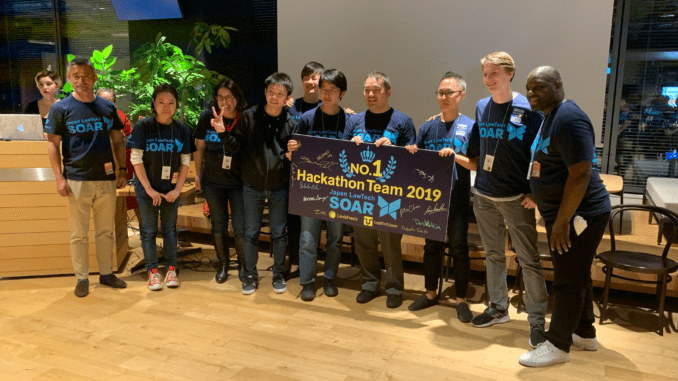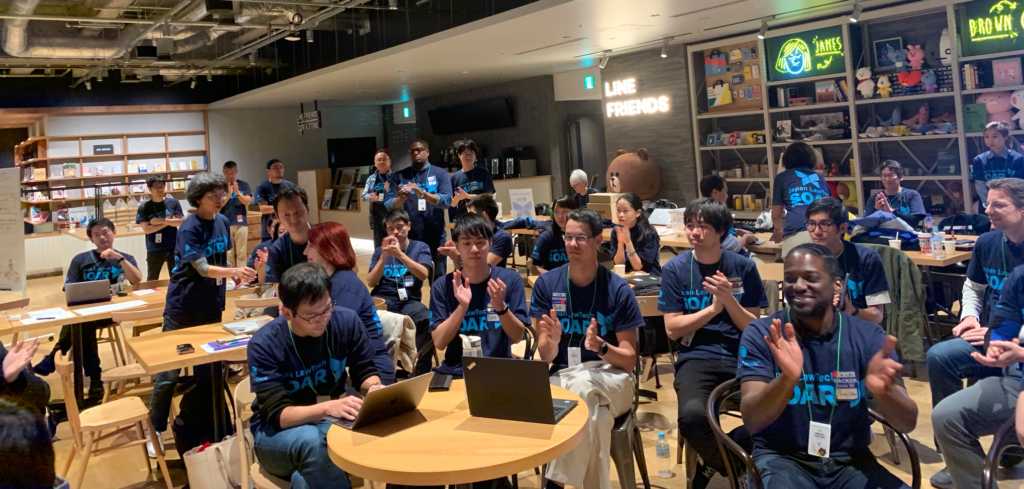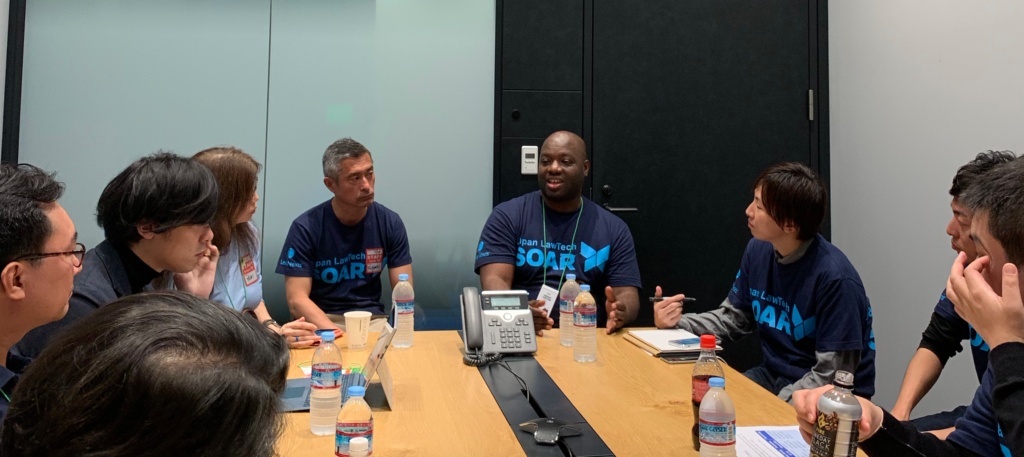
Last week, Artificial Lawyer’s Founder attended the SOAR legal tech hackathon in Tokyo as a judge. It was the first ever event of its kind in Japan, the third largest economy on the planet – but one where the legal innovation movement is only just starting.
So, it was great to be asked by the organisers, LegalTechJapan founder, Maurice Rabb, and LexisNexis Japan, to come along and be part of such an event, and speak at the conference the day after to a room full of local lawyers using simultaneous English to Japanese translation.
In many ways the entire event felt special, as it’s not often you get the chance to be at the start of what is in effect the opening up of a major new market for legal technology. Here are some thoughts on what happened.
—
The 1st Legal Tech Hackathon In Japan
SOAR was hosted high up in one of Tokyo’s skyscrapers, right in the heart of Shinjuku, giving participants a view across the massive city.
While the majority of people taking part were Japanese – as you’d expect – there was a contingent of people from all over the world who currently live and work in Tokyo – including one tech expert who is at Linklaters’ local office. And it was nice to see how legal tech had brought so many people together from all over the world.
Overall there were about 40+ hackathon participants, who broke out into five teams. The solutions were quite diverse:
- an online wills and estate planning tool,
- litigation evidence indexing tool,
- contracts modularization platform,
- compliance training gamification system, based on videos,
- and a tool to improve Japanese legal research.
We also had a large panel of judges, featuring experts from across the region and at home, including the likes of Bumpei Izawa – head of the Japanese Legal Tech Association, and who founded his own class action management platform; Michael Lew from Singapore, COO at Rajah & Tann Technologies; Min Chen VP & CTO, LexisNexis Asia Pacific and based in Shanghai, China; and Carl Im, Chief Technology Officer at Yulchon law firm in South Korea and CEO of Iolex, to name a few.
In short, this was an event that brought together a wide range of talents and expertise across the Asia-Pacific region.
But….all that being said, what would the hackathon teams come up with? And would the judges be able to agree on a clear winner?

The Results and What We Learned
As noted above, the five teams explored a range of problems and solutions. Each group also had at least one or more coders to help make something concrete out of the ideas they were brainstorming and then trying to product design into reality.
The winner – and by a significant margin – was the wills and estate planning application, which was called Testament (in main pic).
Why did this one win? The reasons were several. First, and which came as a surprise to some of the international judges, most people in Japan don’t have wills. This is because it’s regarded as impolite to discuss the subject – and so many Japanese families end up facing a sometimes chaotic probate scenario. Some of these matters then end up in court. All of which could be avoided.
The online will platform for Japan, which in the US and UK may have seemed quite normal, was in fact something of a breakthrough. Also, what set it apart from other will platforms that are starting up now in Japan is that it involved a sophisticated asset management and estate planning function, which the team said no others in Japan provided. This included allowing valuations of individual assets to be added to the online system.
Would this being online reduce the social barriers to making wills? We cannot know yet, but perhaps online wills are a little less tricky to manage than having a big face to face sit-down with a law firm to discuss such a delicate subject in Japan?
So, all well and good. But what really set this one apart from the others was that they had actually done some market research. They also very clearly set out what the problem was and why the market really needed it, i.e. an absence of wills.
The other teams also came up with good products, the modular contract creation platform was especially good, so too was the evidence logging system. However, the use cases were not set out quite as strongly, even if the applications clearly would be useful.
The other learning from this event was just how important the presentation is. You only have a very short time to explain your product to the judges. It’s easy to think the important bit is X, when really the bit the judges will want to know is Y. And ‘Y’ is usually the part that explains what the problem is, why it really matters, and then specifically how your product solves it, or at least part of it. Showing how things work – perhaps ironically – is not on its own the makings of a good presentation.
This happened a couple of times, with one team in particular focusing on the demonstration of one aspect of their product that was very entertaining, but which had little to do with the overall value proposition – which actually only came out after several questions from the judges.
Moral of story: don’t waste time showing a cool aspect of the product’s workings if you haven’t first 100% crystal clear made the case for why the product needs to exist and exactly how it solves that problem.
Overall, the hackathon was impressive. The vast majority of people involved in the teams had never been part of a hackathon before, and no one had been involved in one focused on legal tech. With that in mind the results were as good, if not better, than hackathons in markets such as the UK.
This all bodes well for the Japanese legal tech community. And given the feedback on the event, it looks certain that there will be a SOAR 2.0 next year.

Conclusion
The day after, there was a conference-style event, with a series of keynotes given to an audience of Japanese lawyers. Artificial Lawyer’s Founder gave one on the need to develop the economic logic behind implementing legal technology solutions – with plenty of references made to Japan’s trailblazing industrial companies, such as Toyota, which have created a model for process improvement that remains an inspiration to many in the West.
The point was made that Japan, a country that is heavily focused on design, efficiency, process and automation, was perfectly set up to have a massive and positive impact on legal innovation.
Later, an inhouse lawyer from a manufacturing company came up to say that he agreed, and that even though the company was focused on efficiency in terms of producing its goods, they had not really thought about applying the same principles to legal work….but now wanted to.
In fact, it was clear that many in the audience were from inhouse legal teams. And that is a good sign. As mentioned previously, one of the things that Japan – and other markets – can learn from the US and UK experience is to give equal focus to providing solutions to inhouse teams from day one, and not be so disproportionally focused on private practice lawyers – who are obviously the sellers of legal services, rather than the end users.
I.e. if the in-house teams are the root of legal demand, that’s where we should start, or at least pay them equal attention.
So, all bodes well. There are clearly a number of energised and engaged people in the legal sector in Japan who want to explore what legal tech can do. We have organisations, such as LegalTech Japan and LexisNexis Japan, that want to take things forward. And we have an inhouse legal community that seems to already be starting to focus on how they can drive change in legal services. It’s also worth mentioning that a representative of the Japanese Government was in attendance and expressed their full support for more efficient legal services delivery and improved court processes, which was also great to see.
All the constituent parts are in place for plenty of change to come. Making that change a reality will not be easy. But, this is about as a good a scenario as we can hope for.
–
Last word, Artificial Lawyer would like to say a special thank you to Maurice Rabb and the team at LexisNexis Japan who provided such fantastic hospitality and organisational skills that made SOAR the success it was. Can’t wait for the next one!
3 Trackbacks / Pingbacks
Comments are closed.